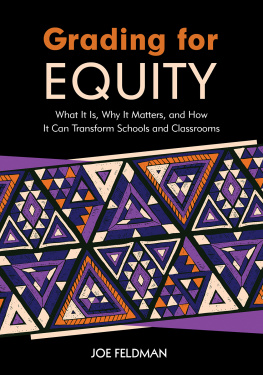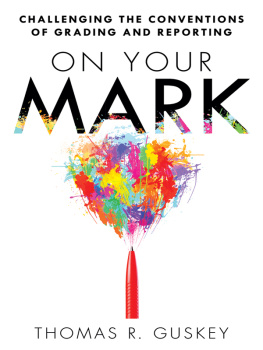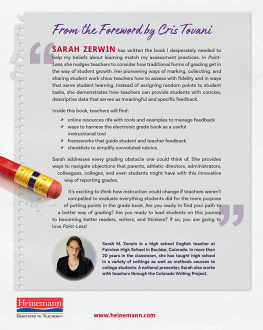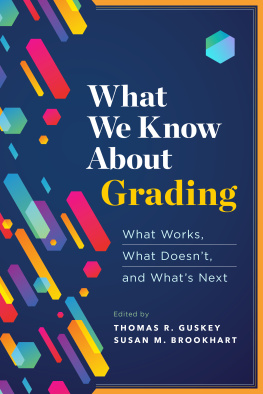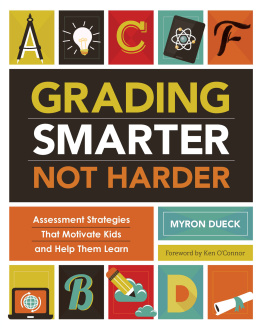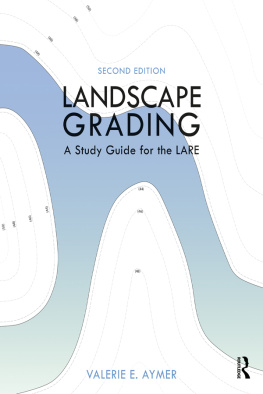Praise for Grading for Equity
We dont usually think of grading when talking about equity, but in Grading for Equity: What It Is, Why It Matters, and How It Can Transform Schools and Classrooms, Joe Feldman helps us see why grading is an integral part of an equity agenda. He shows us how we can use grading to help students become the leaders of their own learning and lift the veil on how to succeed. He reminds us that authentic assessment and transparent grading are essential parts of a culturally responsive classroom. This must-have book will help teachers learn to implement improved, equity-focused grading for impact.
Zaretta Hammond, Education Consultant and
Author of Culturally Responsive Teaching and the Brain
St. Marys Colleges Kalmanovitz School of Education
This book will stop educators who want to improve their practices with underserved students right in their tracks. Feldman offers an insightful invitation to teachers who dare change the ways in which we have been taught to grade students products. He demonstrates how our grading practices are grossly under-substantiated and too often unquestioned, and he challenges educators to build equitable assessment tools and mechanisms to support learning and development of all students. Grading for Equity penetrates macro-level grading policies to transform micro-level teaching practices that embrace the cultural and the contextual. A must read for justice-centered educators.
Rich Milner, Co-Author of These Kids are Out of Control and
Cornelius Vanderbilt Professor of Education
Peabody College, Vanderbilt University
Wow, Wow Wow!!! This book hooked me as a not-to-be-missed read right from the Prologue. Joe Feldman makes a strong case for shared grading practices to overcome the inequity of traditional grading, with solid reasoning, well-chosen research evidence, and perhaps most significantly, the powerful and frequent use of teacher voice. The chapters organizing structure encourages thoughtful and reflective reading, and will be particularly beneficial for book study within PLCs.... The main message of the book for me is summed up in this quote, We teachers cannot continue to sacrifice the integrity and reliability of our grades at the altar of professional autonomy.
Ken OConnor, Author and Consultant
How to Grade for Learning
There is growing awareness within the industry of education that traditional grading practices have become a barrier to meaningful student learning. One dilemma is that there is a lack of resources to support educators who want to adopt new grading practices that are both accurate and equitable. Joe Feldman addresses this need with his book, Grading for Equity. Joe skillfully makes a compelling argument for change and offers specific ways educators can make profound differences to their grading practices. Students become intrinsically motivated to learn when their grades accurately measure where they are in the learning process. Students who typically give up any hope of success can now approach learning with a positive growth mindset. Grading for Equity will provide clarity and tools for an individual instructor or as a book study for an entire organization.
Jeffrey Tooker, Deputy Superintendent of Educational Services
Placer Union High School District
Joe Feldman peels back the curtain and shows the many flaws of our traditional grading system. His arguments are convincing - and the alternatives he proposes are both practical and powerful. Reading this book will make you re-think the way you assess students and will inspire you to enact a system that encourages revision and redemption instead of compliance and corruption.
Denise Pope, Senior Lecturer,
Stanford Graduate School of Education
and Co-Founder, Challenge Success
Grading for Equity
This book is dedicated to Nikole, Olivia, and Ellis, for their love, courage, and joy.
Grading for Equity
What It Is, Why It Matters, and How It Can Transform Schools and Classrooms

